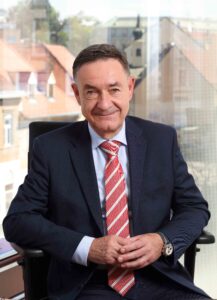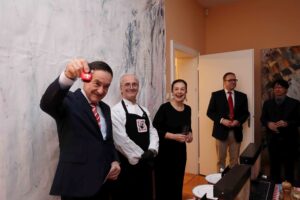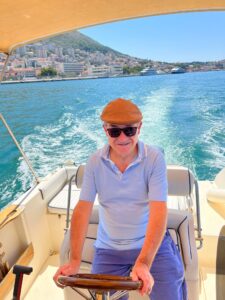Croatia has gone a long way in a short time and our relations have developed accordingly.
H.E. Urs Hammer Ambassador of Switzerland to Croatia ends his mandate in a few weeks. In an interview for Diplomacy&Commerce magazine, we talked about the political and economic cooperation of the two countries, mutual assistance to Ukraine, but also about the numerous Croatians living in Switzerland. Ambassador Hammer also reveals which places in Croatia have particularly impressed him and recommends what to visit when you are in Switzerland.

- As a representative of one of the most developed countries in the world, how would you evaluate the political relations between Switzerland and Croatia today? It seems that there are no issues between the two countries at a time of instability in the world?
The bilateral relations between our two countries are very good, especially in the areas of economy, politics, culture and tourism. Over the last years, we have been working increasingly together in humanitarian demining in the Ukraine. Our two foreign ministers Ignazio Cassis and Gordan Grlić Radman have developed close relations over the last years. And as Minister Grlić Radman has lived in Switzerland for a long period, I am probably the only Swiss Ambassador worldwide who can talk with the Foreign Minister of his host country not only in German, but in Swiss German! The substantive conclusion of Swiss-EU negotiations at the end of 2024 marked an important step to consolidate our bilateral approach with the EU, thereby also further strengthening our bilateral ties with Croatia. The Swiss Contribution to Croatia is a vital instrument in strengthening bilateral relations between the two countries. Established as part of Switzerland’s commitment to reducing economic and social disparities within the enlarged EU, the Swiss Contribution focuses on promoting economic, social, and environmental development in Croatia. The successful implementation of projects funded under the first Swiss Contribution has had a profound impact on society, improving essential infrastructure, fostering innovation, and enhancing the quality of life for citizens. By combining the expertise of Croatian and Swiss professionals, we have made a lasting, positive impact on local communities. Upgraded water and wastewater systems, safer environments through demining efforts, and stronger academic and research frameworks have all contributed to more resilient communities, better equipped for future challenges. The projects have also promoted sustainable development and strengthened partnerships at local, national, and international levels, particularly through the engagement of NGOs and collaborative research. Overall, these achievements lay the foundation for long-term economic growth, environmental protection, and social well-being, benefiting both present and future generations. The second Swiss Contribution, amounting to 45.7 million CHF, is currently in its initial phase of implementation and continues to focus on similar areas, with the addition of a new focus on palliative care. Over the years, we have established a strong working relationship with our local partners and are looking forward to the continued successful implementation of this important programme.
- In addition to good political relations, the economy is very important between countries. What do the numbers show, in which direction are economic relations developing and in whose favor? Which industries are most interesting for Swiss investors?
Switzerland and Croatia have strong economic ties, marked by a growing trade in goods and services and increasing investment. Switzerland and Croatia are important trading partners, with a focus on pharmaceuticals, machinery, chemicals, and food products. The trade in goods is pretty balanced, however Croatia scores much better in services, where Swiss tourist arrivals play a dominant role. More than 300’000 tourists visit Croatia annually and Croatia is becoming more and more popular. Both countries benefit from the cooperation within the framework of Switzerland’s bilateral relations with the EU. Swiss companies have made significant investments in Croatia and Switzerland currently ranks as the 12th biggest investor. There are around 70 Swiss companies operating in various sectors in Croatia and generating several thousand jobs. They are also a fair representation of the Swiss industry in general. We have here a few large companies, even multinationals, as well as many small and medium enterprises that are the backbone of the Swiss industry. Most of them are members of the Swiss-Croatian Business Association (SCBA – www.scba.hr). Headquartered in Zagreb, the SCBA is a networking platform that connects Swiss companies operating in Croatia, with the aim of supporting the development of economic ties and facilitating business cooperation. From my contacts with our companies in Croatia, I hear they are attracted to Croatia very often because of the skilled labour force. Croatians excel in foreign languages too and adapt very well to high Swiss standards. Very appealing to Swiss companies is Croatia’s attractive geographical location and its proximity to Switzerland as well as its EU membership, which has made business practices so much simpler. In the last few years, we have seen an increased interest in Croatia among Swiss investors with special attention given to the IT sector.
- Where do you see the space for improvement when we talk about the development of the economy?
We see lots of potential for the further development of our economic ties especially with the increasing focus on new technologies and innovations like Artificial Intelligence (AI) or the gaming industry. As both countries have strong tech sectors and lively start-up scenes, there is a significant potential for collaboration in areas such as AI, digitalization, and automation. Swiss companies are renowned for their advanced technological expertise, which could benefit Croatia’s growing IT and tech industry. Furthermore, Croatia’s strategic position within the EU opens up additional opportunities for Swiss companies to expand into European markets. We at the Embassy have recognized this potential and are currently preparing a trip to Switzerland for the Croatian Artificial Intelligence Association CroAI where they will meet with different important stakeholders. With this, we wish to facilitate investment opportunities between Croatian and Swiss AI ecosystems, collaboration in key projects and activities as well as institutional and educational exchange. In addition to the tech sector, we also see strong potential for deeper cooperation in other areas such as rail infrastructure, renewable energy, and the broader green transition. These sectors are increasingly relevant in both countries and offer a promising framework for sustainable collaboration.

- A large number of Croats live in Switzerland. How do you see their role in the development of mutual relations, when we talk about culture, tourism? What would you single out from the Embassies’ plans when we talk about culture and education?
If you include double-citizens, there are about 100’000 people of Croatian origin living in Switzerland. Since several decades, they have contributed significantly and positively to the economic, scientific and cultural success of my country. This year, we commemorate 50 years of the Nobel Prize Award for Vladimir Prelog who has a lot in common with Lavoslav Ružička, who also received the Nobel Prize in Chemistry in 1939. Both were working at the ETH in Zurich. With his research, Ružička revolutionised the perfume industry, which adopted his synthetic musk compounds, while the pharmaceutical industry used his synthetic vitamin compounds. The annually awarded Ruzicka Prize is considered one of the most important awards for the promotion of young scientists in the field of chemistry in Switzerland. Some of the most important members of the Croatian community in Switzerland right now are Damir Bogdan, CEO of BaselQuantum, and Marijana Jakić, CEO of St. Moritz Tourism, my hometown. The famous football player Ivan Rakitić also grew up in Switzerland, but cleverly decided to play for the Croatian national team. There is also a Croatian Swiss Economic Club active in Switzerland since 2017.
- Switzerland is very attractive with wonderful nature. What would you recommend to everyone who comes to visit and what would you single out as a special feature/trade mark of Switzerland?
Switzerland is very diverse in terms of language, culture, landscape and cuisine. It is therefore difficult to give a general recommendation. Depending on your individual preferences, you might enjoy visiting Swiss cities with their rich cultural heritage, hiking in the mountains in summer or skiing in winter, or even taking a round trip on the Grand Tour. Further information and seasonal suggestions can be found on the Switzerland Tourism website. (https://www.myswitzerland.com/en-ch/ ).
My personal favorites include the Glacier Express and Bernina Express railway lines, boat trips on Lake Geneva, Lake Lugano and Lake Lucerne, and a visit to a Swiss wine region. Like Croatia, Switzerland has a variety of excellent wines that are not yet well known internationally and are only produced in limited quantities. In summer, I also enjoy hiking in one of the many Swiss Alps to enjoy the unique Alpine cheese made from fresh cow’s milk in the local mountain huts. A typical feature that contributes to the enduring popularity of quintessentially Swiss products such as cheese, watches and chocolate is the unique blend of tradition, innovation and high-quality control.

- Your mandate in Zagreb ends in a few months. What impressions do you have from Croatia and what would you single out? Croatia is also a tourist country, a large number of Swiss come to our coast. What would you recommend to your friends to visit or try when they come?
Like Switzerland, Croatia is an extremely diverse and attractive country in terms of landscape, making it difficult to single out a single visitor tip. During my term of office, I endeavored to travel around Croatia and experience its diversity. I have particularly fond memories of last year’s Swiss evening in Split, which we celebrated with the opening of the exhibition ‘Saziv – Assembly’ featuring paintings and sculptures by my wife Raffaela Zenoni in the Old Town House and with a typical Swiss folk band. The event was supported by St. Moritz, whose mayor Christian J. Jenny had a fruitful exchange with his counterpart in Split, Mayor Ivica Puljak. I have also gentle memories of our guest appearance in 2023 at the Varaždin Baroque Evenings, the DOKUart Festival in Bjelovar and my trip to Istria last year, where I visited various Swiss-Croatian entrepreneurs. Moreover, together with my two sons, I took part in a fascinating week-long boat trip between Dubrovnik and Split with detours to different islands. And last but not least, Zagreb also has a wealth of culinary and cultural attractions that I enjoy visiting with my wife and friends and will continue to do so, because even after I retire, we will be regular guests in wonderful Croatia.